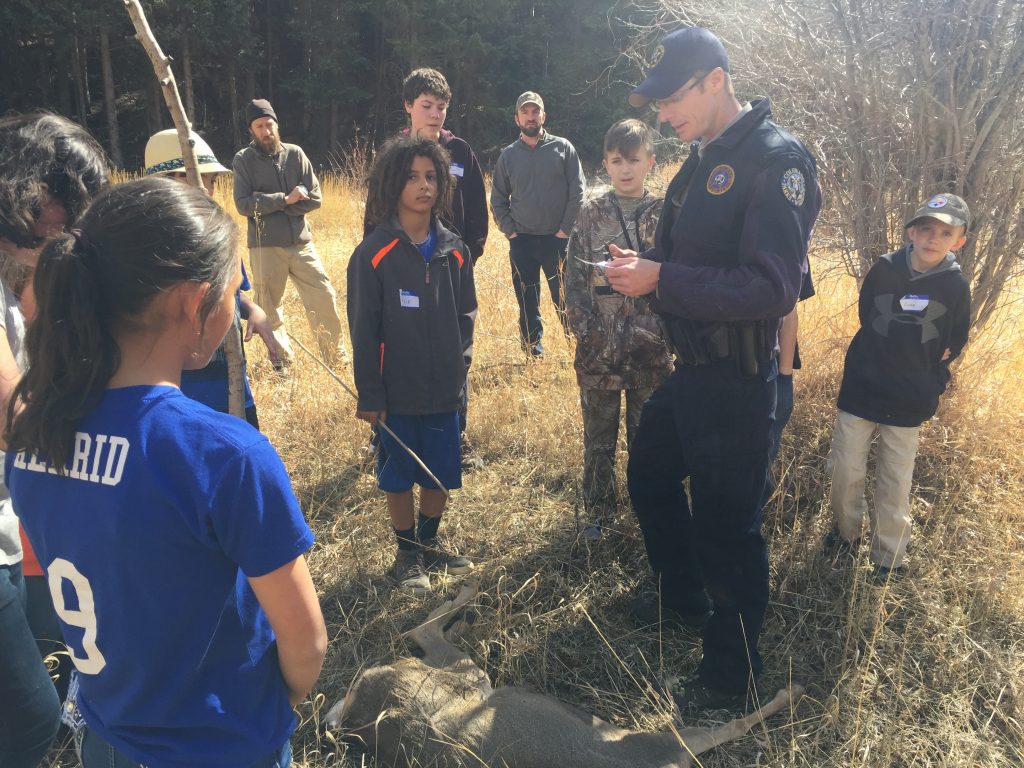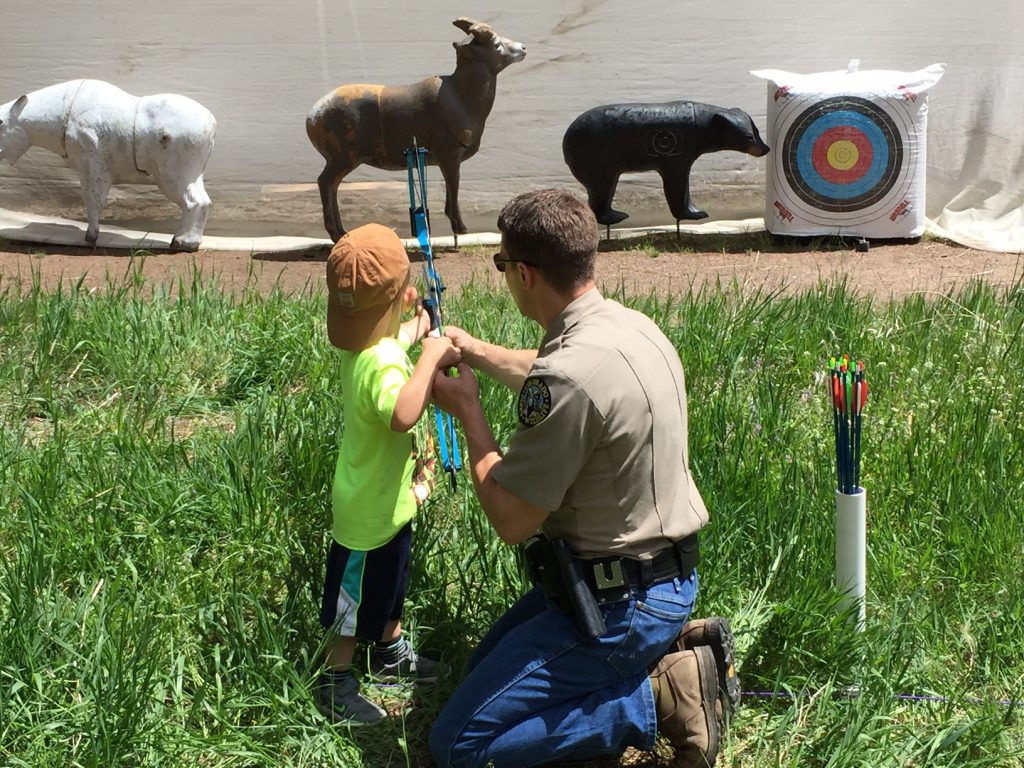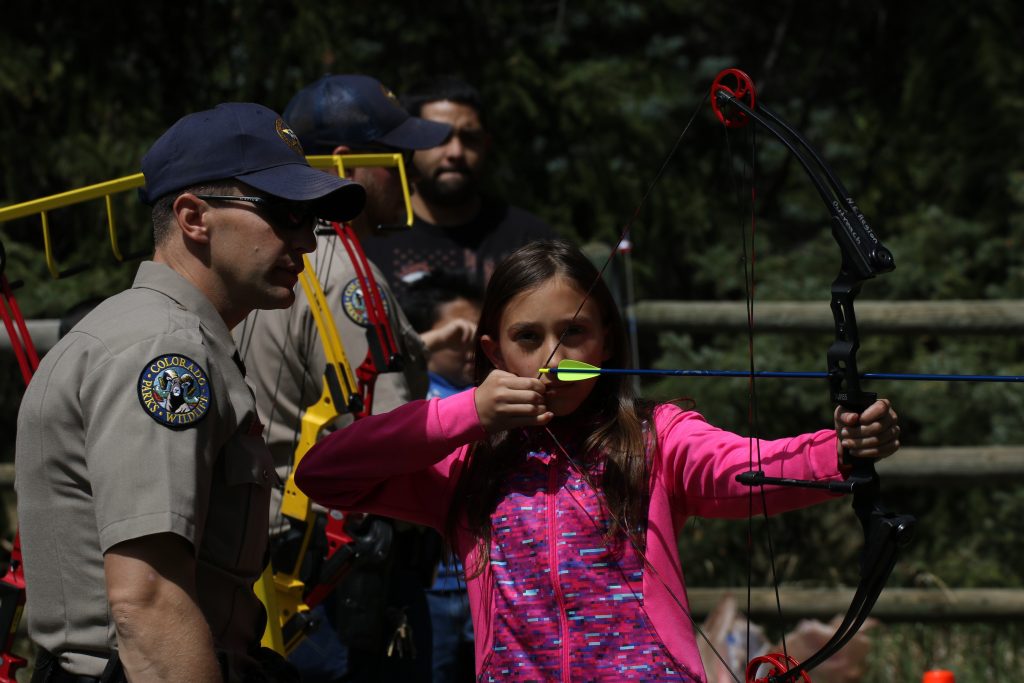
Photo is of the junior game warden class taught in Evergreen, Colo. in conjunction with the Jefferson County public schools.
This is the fourth of six articles written by wildlife officer Scott Murdoch that will be distributed throughout the summer. Each will come out roughly a week in advance from when wildlife officers from Park, Jefferson, Clear Creek and Gilpin counties host Coffee with a Wildlife Officer get-togethers, providing the public with an opportunity to meet their local wildlife officer and ask them questions. Times/locations for the fourth Coffee with a Game Warden sessions at local establishments on July 10 are listed at the bottom of the article.
CONIFER, Colo. – Welcome back, my name is Scott Murdoch and I am a District Wildlife Manager with Colorado Parks and Wildlife (CPW). I work in the Conifer area along U.S. Highway 285 in part of Park and Jefferson counties.
This article is the fourth of a series of articles that will highlight how wildlife is managed in Colorado. CPW is the state agency responsible for managing the wildlife that calls Colorado their home. Our agency employs aquatic and terrestrial biologists, researchers, property and hatchery technicians, administrators, wildlife officers, investigators, engineers and many others to accomplish the broad mission of conserving and protecting the state’s 960 game and non-game species. More than 70 percent of CPW’s wildlife programs to conserve and protect those species are paid for by the license fees from hunters and anglers. CPW does not receive general tax dollars to fund its wildlife conservation programs.
In the first few articles, I described that our district wildlife managers are commissioned wildlife officers which focus on law enforcement, biology and education. Today, I will describe a large part of my daily job, wildlife education.
So much of CPW’s mission relies on the employees to be educators of some kind. We have dedicated education folks that spend their career working on educating people about wildlife. We have other roles that spend parts of their day as an educator.
While my role as a wildlife officer may seem to focus mostly on law enforcement or the biology aspects, education takes up a significant amount of my time and is vitally important. Many days are spent teaching hunter education, teaching 4H, talking to students at the local schools, teaching people how to fish, participating in outdoor skills days by coaching those wanting to be involved in the outdoors, mentoring novice hunters, educating the public about bear and lion conflicts, teaching about laws and regulations to hunters and anglers and instructing homeowners how to live with the deer and elk in neighborhoods. Many days are also spent teaching other officer’s critical skills, such as firearms handling and shooting, defensive tactics and arrest control, boat operation, ATV operation and horsemanship to name a few.
I can’t tell you how often someone approaches me at the gas station, lake, or trail to ask a simple question and have that question turn into a 30 minute or one-hour conversation about all things wildlife related. The public loves wildlife and so do I.
These topics are easy to talk about and get a lot of interest from the public. There are a lot of members of the public that know a tremendous amount about the wildlife around them and others that know very little. There is an expectation in the mountain communities that people living there, whether natives or transplants, know the basics about living with wildlife. We help teach people what to do with the wildlife living around them. I have taught classes for realtors about living with wildlife so they can help inform buyers with the reality of living in nature. We talk with homeowner associations and schools about bear and lion issues and why it is detrimental to feed the deer, elk and moose. I hope that by teaching the public, they then can become teachers too, ultimately reducing our negative impact on wildlife when we live in their habitats.
One of the great parts of my job is to share my passion as a hunter and angler and teach others about hunting and fishing. Hunting and fishing plays an integral role in the management of wildlife and is one of the very few activities that you can directly interact with wildlife. The benefit too is that you can take home a wonderful, fresh, organic, free-range, hormone-free meat to feed your family.
Our wildlife is an incredible resource and education is part of what makes that resource sustainable. Hunting and fishing are highly regulated and there are stiff penalties for those that don’t follow the rules. Sometimes the reason people don’t follow the rules is not that they are being malicious, but rather they don’t know or are confused. It can go a long way with members of the public to educate rather than cite them for a violation. Remember, the goal is compliance with the law, and many times that just involves education.
There are so many people that have a desire to become a hunter or angler, but don’t have the know-how or a mentor to show them. CPW has stepped up in many ways to try and teach novice hunters and anglers. The hunter outreach program helps mentor many novice hunters each year. Fishing clinics by CPW reach over 20,000 people statewide. Finally, the many outdoor skills days, archery classes, and shooting classes teach critical skills to emerging hunters and anglers. If you want more information about CPW’s educational outreach events by clicking here.
There are so many other educational events that CPW puts on each year in different places of the state. If there is something you are interested in feel free to look at the CPW website or call one of our offices. To highlight the wide variety of educational outreach, we only need to look to one event in Evergreen put on by the local wildlife officer. The event is a junior game warden class taught in conjunction with Jefferson County Public Schools. It is part of their outdoor lab curriculum, where students learn about poaching, evidence collection, investigation and prosecution. Every year it gets rave reviews by all students, inspiring many to investigate a career in wildlife management.
When I first got into this career, I didn’t see myself as a teacher. The longer that I am in this career, the more I realized how critical that education component is. The public yearns for information about wildlife, what CPW does and opportunities to be in nature. CPW field staff, biologists, district wildlife managers and CPW dedicated educators do their best day-in and day-out to give the best information to the public regarding the wildlife resource.
The next time you see wildlife, know that the local wildlife officer is looking after the wildlife that you so cherish. If you would like to meet your local wildlife officer, please come with questions and share coffee with us on July 10th at the following locations and times:
Coffee with your local wildlife officer on July 10 at:
Conifer: 9-10 a.m. at Dutch Bros Coffee: 10855 US Hwy 285
Evergreen: 9-10 a.m. at Java Groove: 28186 CO-74 #1
Black Hawk: 9-10 a.m. at B&C Coffee: 135 Clear Creek St.
Fairplay: 9-10 a.m. at The Java Moose: 730 Main St.
In the coming weeks, we will look at other aspects of wildlife management in Colorado. If you have any general wildlife questions, please call the Northeast region CPW office at 303-291-7227.
Poaching is a crime against you, your neighbor, and everyone else in the state of Colorado. Call 1-877-COLO-OGT toll-free or Verizon cell phone users can simply dial #OGT to report it. If you’d prefer, you can e-mail us at


Leave a Reply